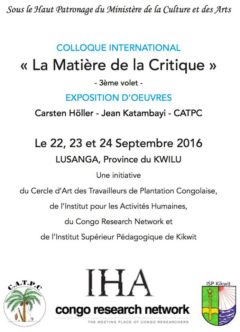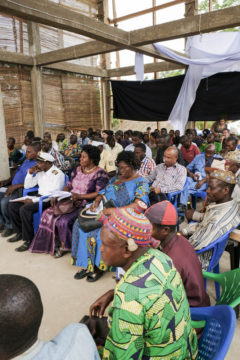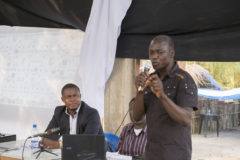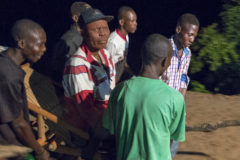The third edition of The Matter of Critique took place on 22, 23 and 24 September 2016 in Lusanga.
In the build-up to its opening, the Lusanga International Research Centre for Art and Economic Inequality (LIRCAEI), addressed the function and long-term goals of such a research centre that is located on a plantation in rural Africa. How have other Congolese artistic projects mediated their mission within a capitalist reality? How can an inclusive space that acknowledges local and global economic realities also take an active role in redressing these realities?
Programme of the third edition
The conference brought together some of the most vocal (Congolese) artists, spiritual practitioners, academics, (former) plantations workers an members of Cercle d’Art des Travailleurs de Plantation Congolaise (CATPC). Together they will explore ways to make use of art and creativity, but also rural land, current value chains and the research centre as a speculative tool.
1. Leverville/Lusanga and its history
How have the plantations developed over time, and how have they affected local, national and international cultural production?
Participants: Elikia M’Bokolo (EHESS, Paris), Bruno Lapika (UNIKIN, Kinshasa), René Ngongo (President CAPTC), Cécile Fromont (University of Chicago)
2. Africa and dominant regimes of art
What are the rationales and motivations behind establishing African art biennales and museums? In what way have they counteracted and contributed to the reproduction of global cultural segregation?
Participants: Sarah Van Beurden (Ohio University), Eva Barois De Caevel (curator, Paris)
3. Lusanga and contemporary financial capitalism
How is financial capitalism linked to the palm oil plantations? What are the (environmental and social) consequences of the financialisation of agricultural production, poverty reduction, climate change and the conservation of the rainforest?
Participants: Jean-François Mombia (RIAO-RDC), Erick Kassongo (Congolese centre for sustainable development)
4. Art and economic inequality: Economic speculation on another future
What type of cultural institution (biennial, museum or other) could produce changes within the existing (exploitative) value chains, to give art a renewed mandate? How can we speculate on the economic effects of art?
Participants: Suhail Malik (Goldsmiths, London), Ariella Azoulay (Brown, Providence), Filip de Boeck (KU Leuven), Renzo Martens (University College Ghent)
Organisers include: Edmond Mayambo (Institut Supérieur Pédagogique Kikwit), Katrien Pype (Congo Research Network), CATPC and Institute for Human Activities.
Download the full programme:
complete program MoC III
with the generous support of





